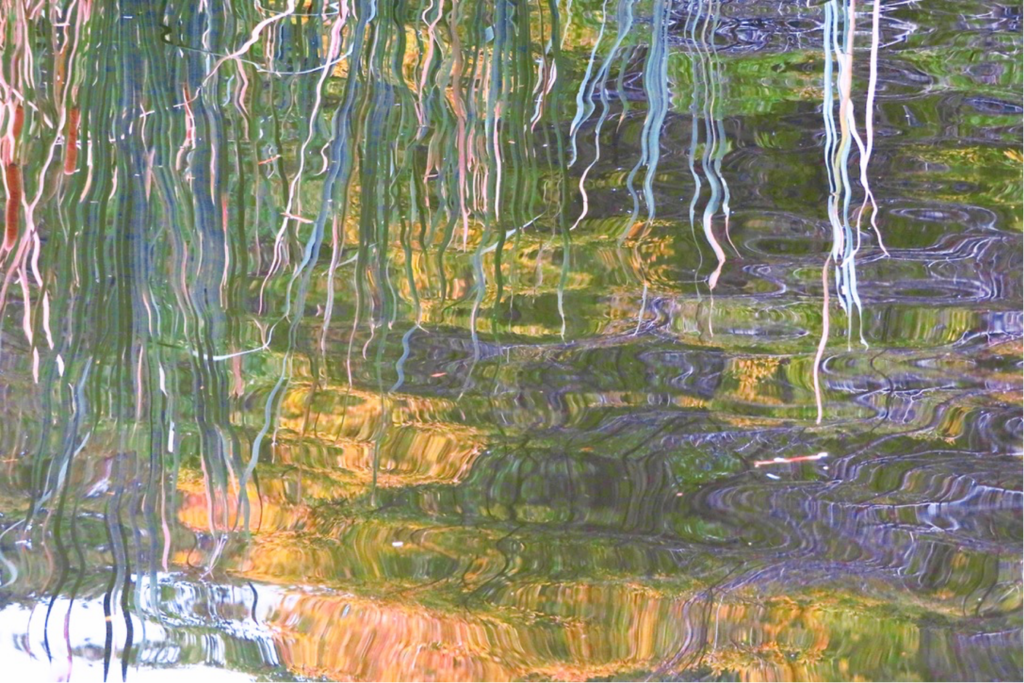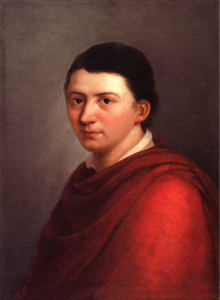The river
(Poet's title: Der Fluss)
Set by Schubert:
D 693
[March 1820]
Part of Schlegel: Abendröte (putative cycle)
Wie rein Gesang sich windet
Durch wunderbarer Saitenspiele Rauschen,
Er selbst sich wieder findet,
Wie auch die Weisen tauschen,
Dass neu entzückt die Hörer ewig lauschen.
So fließet mir gediegen
Die Silbermasse, schlangengleich gewunden,
Durch Büsche, die sich wiegen
Vom Zauber süß gebunden,
Weil sie im Spiegel neu sich selbst gefunden.
Wo Hügel sich so gerne
Und helle Wolken leise schwankend zeigen,
Wenn fern schon matte Sterne
Aus blauer Tiefe steigen,
Der Sonne trunkne Augen abwärts neigen.
So schimmern alle Wesen
Den Umriss nach im kindlichen Gemüte,
Das zur Schönheit erlesen
Durch milder Götter Güte
In dem Kristall bewahrt die flücht’ge Blüte.
In the same way that a pure song meanders
Through the miraculous resonance of strings as they are played
And finds itself again,
And just as the melodies interweave
So that the listeners, newly enraptured, continue to pay attention:
That is how, for me, the river flows so solidly
In a silver mass, twisted around like a snake,
Through bushes which sway
As they are sweetly bound up in the magic
Since they have found themselves anew in the mirror;
Where the hills are so keen
(And bright clouds are keen) to show themselves rocking gently,
While faint stars in the distance are already
Climbing out of the blue depth,
The drunken eyes of the sun bend down.
Thus it is that all beings gleam
In outline within a childlike attitude,
Which, dedicated to beauty
Through the gentle goodness of the gods,
Preserves the transitory blossom in the crystal.
All translations into English that appear on this website, unless otherwise stated, are by Malcolm Wren. You are free to use them on condition that you acknowledge Malcolm Wren as the translator and schubertsong.uk as the source. Unless otherwise stated, the comments and essays that appear after the texts and translations are by Malcolm Wren and are © Copyright.
☙
Themes and images in this text:
Bending Blue Bushes and undergrowth Climbing Clouds Evening and the setting sun Eyes High, low and deep Hills and mountains Lost and found Magic and enchantment Melody Near and far Mirrors and reflections Rivers (Fluß) Rocking Silver Snakes Songs (general) Stars Stringed instruments (unspecified) The sun Surface of the water Swaying and swinging Sweetness
The syntax is almost as slow-flowing and twisted as the meandering river that is supposedly expressing these reflections. However, the ultimate destination is clear in both cases: the river is going towards the sea and the grammar of the long sentence that constitutes the first three stanzas leads towards the main verb at the end. The sun sets. This is reformulated poetically as ‘the sun’s drunken eyes bend down’ or ‘the sun lowers its drunken eyes’. The plural (‘eyes’ rather than the more logical ‘eye’) brings the image of the meandering river vividly to life: as we observe the scene before us we see numerous channels of the river, and thus the sun is reflected more than once. There are multiple mirrors here.
Similarly the images twist and multiply. We begin with music (strings and a voice), with tunes that come and go, holding the listener’s attention through both repetition and variation. The flowing water of the river is at the same time solid, twisted metal, with the silver forming a mirror. The reflections within it shimmer: the bushes sway, the hills and the clouds bob up and down, suggesting that the river has now become a cradle. The highest, faintest stars can only be reflected in the water as they climb up from the depths. The whole process of sunset and the changing landscape has been revealed to us on the (otherwise invisible) surface of the river.
Everything gleams on this metallic yet fluid surface, but it is the human mind that reflects on the reflections. The poet beholds the river in its multiplicity and is allowed to preserve the fleeting moment. The beautiful transitory blossom can be fixed in this glass, the crystal that is itself a suspended liquid, as opposed to the solid silver (the silver mass) that forms the back of the mirror. This unseen but all seeing glass is present both in the river at sunset and in the child-like attitude of the poetic spirit that is observing it, common to the poet and (he trusts) his readers. We are being invited to reflect.

☙
Original Spelling and note on the text Der Fluß Wie rein Gesang sich windet Durch wunderbarer Saitenspiele Rauschen, Er selbst sich wieder findet, Wie auch die Weisen tauschen, Daß neu entzückt die Hörer ewig lauschen: So fließet mir gediegen Die Silbermasse, schlangengleich gewunden, Durch Büsche, die sich wiegen Vom1 Zauber süß gebunden, Weil sie im Spiegel neu sich selbst gefunden; Wo Hügel sich so gerne Und helle Wolken leise schwankend zeigen, Wenn fern schon matte Sterne Aus blauer Tiefe steigen, Der Sonne trunkne Augen abwärts neigen. So schimmern alle Wesen Den Umriß nach im kindlichen Gemüthe, Das zur Schönheit erlesen Durch milder Götter Güte In dem Krystall bewahrt die flücht'ge Blüthe. 1 Schubert changed the original 'Von' to 'Vom' (in effect adding 'the' to the word 'magic')
Confirmed by Peter Rastl with Schubert’s source, Fridrich Schlegel’s Gedichte. Erster Theil. Neueste Auflage. Wien 1816. Bey B. Ph. Bauer. page 20; with Musen-Almanach für das Jahr 1802. Herausgegeben von A. W. Schlegel und L. Tieck. Tübingen, in der Cotta’schen Buchhandlung, 1802, pages 137-138; and with Friedrich Schlegel’s sämmtliche Werke. Erster Band. Gedichte. Berlin, bei Julius Eduard Hitzig, 1809, page 16.
To see an early edition of the text, go to page 20 [28 von 190] here: http://digital.onb.ac.at/OnbViewer/viewer.faces?doc=ABO_%2BZ20491940X


